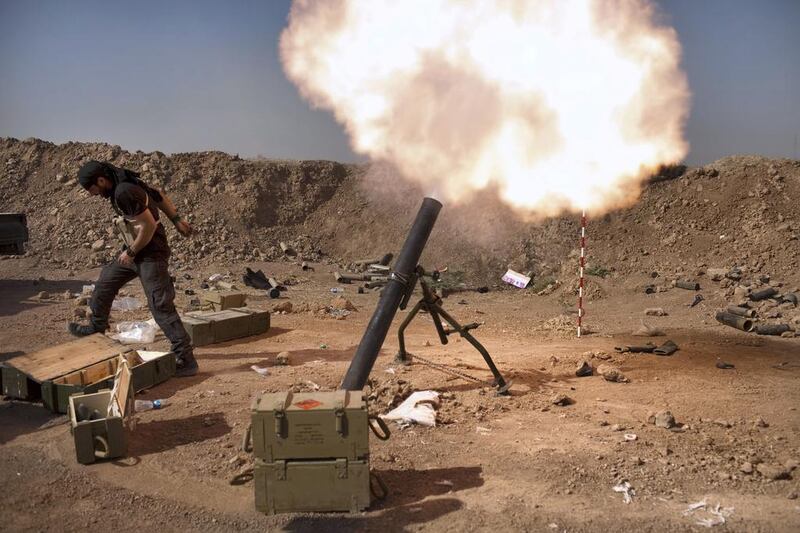BAGHDAD // Iraqi troops broke through an ISIL siege of Amerli on Sunday, where thousands of people have been trapped for more than two months with dwindling food and water supplies.
It was the biggest offensive success for the Iraqi government since militants from the Islamic State in Iraq and the Levant overran large areas of five provinces in June, sweeping security forces aside.
The breakthrough came as the United States carried out limited strikes outside north Iraq for the first time since its air campaign against militants began more than three weeks ago, and aircraft from several countries dropped humanitarian aid to Amerli.
Nihad Al Bayati, who had taken up arms with fellow residents to defend the town, said some residents had fired into the air to celebrate the arrival of the troops.
“We thank God for this victory over terrorists,” Mr Al Bayati said. “The people of Amirli are very happy to see that their ordeal is over and that the terrorists are being defeated by Iraqi forces. It is a great day in our life.”
The mainly Shiite Turkmen residents of the town in Salaheddin province were running desperately short of food and water, and were in danger both because of their Shiite faith, which ISIL fighters consider heresy, and their resistance to the militants, which has drawn harsh retribution elsewhere.
“Our forces entered Amerli and broke the siege,” Iraqi security spokesman Lieutenant General Qassem Atta said.
“It is a very important success.”
Gen Atta said there was still fighting in the area.
The operation was launched on Saturday after days of preparations in which Iraqi security forces, Shiite militiamen and Kurdish fighters deployed for the assault and Iraqi aircraft carried out strikes against militants.
But the government’s reliance on the thousands of Shiite militiamen involved in the operation poses serious dangers for Iraq, risking entrenching groups with a history of sectarian killings.
The United States said it carried out three airstrikes in the Amerli area, expanding its air campaign outside the far north for the first time, while Australian, British, French and US aircraft dropped relief supplies for the town.
The aid drops came alongside “coordinated airstrikes against nearby terrorists to support this humanitarian assistance operation,” said the Pentagon spokesman Rear Admiral John Kirby.
“The operations will be limited in their scope and duration as necessary to address this emerging humanitarian crisis and protect the civilians trapped in Amerli.”
US Central Command said the US supplies dropped included around 47,775 litres of drinking water and 7,000 prepackaged meals.
Three US airstrikes destroyed five ISIL vehicles and a checkpoint.
Western aid for Amerli was slow in coming, however, with the burden of flying supplies and launching strikes in the area largely falling to Iraq’s fledging air forces.
“The US military will continue to assess the effectiveness of these operations and work with the Department of State, the US Agency for International Development, as well as international partners including the government of Iraq, the United Nations, and non-government organisations to provide humanitarian assistance in Iraq as needed,” Mr Kirby said.
The US military also launched airstrikes on Saturday against ISIL forces near Iraq’s largest dam, north of the militant-held northern city of Mosul, the Pentagon said.
Kurdish forces retook the dam after briefly losing it to the militants last month, securing the source of much of the power and irrigation water for the region around Iraq’s second city.
ISIL and its allies control swathes of both northern and western Iraq and north-eastern Syria where their rule has witnessed a spate of atrocities that have shocked the world.
Washington has said that operations in Syria will be needed to defeat ISIL, but has thus far ruled out any cooperation with the Damascus regime.
It has, however, attempted to enlist the support of long-time foe Tehran, a key backer of Syrian president Bashar Al Assad.
Writing in the New York Times, the US secretary of state John Kerry urged “a united response led by the United States and the broadest possible coalition of nations” to combat ISIL.
Mr Kerry said he and the US defence secretary Chuck Hagel would confer with European counterparts on the sidelines of an upcoming Nato summit and then travel to the Middle East to build support “among the countries that are most directly threatened”.
GCC countries stood united against the terrorism, condemning ISIL at a summit on Saturday to discuss security in the region.
“We denounce vehemently the practices of those who use Islam as a pretext to kill and displace en masse Iraqis and Syrians,” said Sabah Khaled Al Sabah, the foreign minister of Kuwait, which currently holds the GCC presidency.
US President Barack Obama has acknowledged that Washington has no strategy yet to tackle ISIL, which has declared an Islamic “caliphate” in the territory under its control in Iraq and Syria.
* Agence France-Presse with additional reporting by Associated Press





